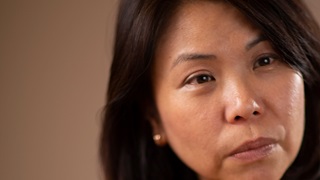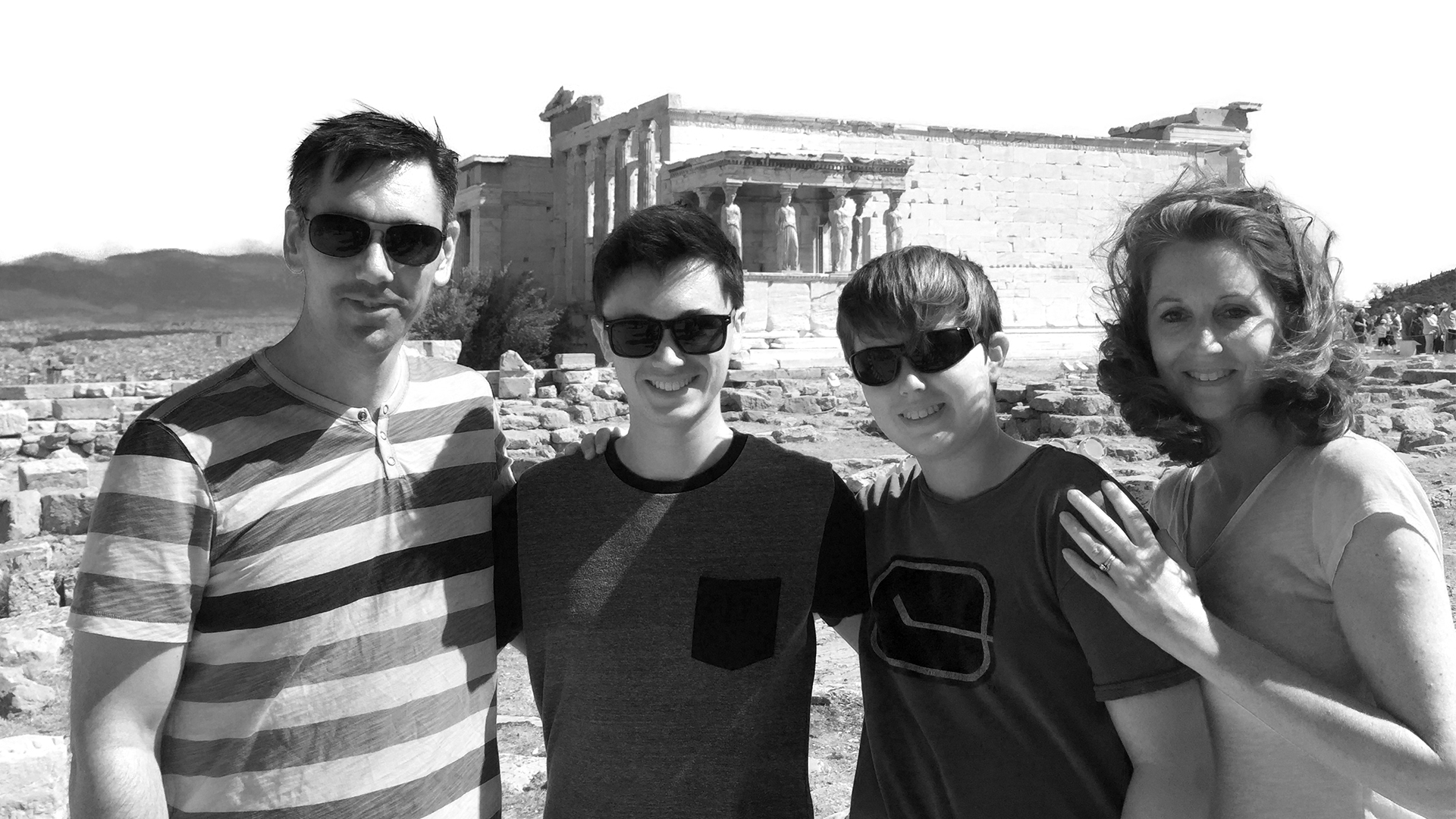
First person
Home to the spoken voice


Janet Grove in conversation with Ingeborg Alexander in 2017
My father was a middle-of-the-night worrier. I come from a line of middle-of-the-night worriers.
I tend to process in my sleep. In my younger years, I would get up and go into the office if something at work was worrying me—this was before you could log in remotely. Now it doesn't happen so often; and, if I do wake in the night, I have gotten better at just writing myself a note and going back to sleep.
I do housework. My kids do housework. I don't have a housekeeper or anything like that. My brother and I grew up doing quite a few chores, and so my kids have their chores. Especially having two boys—they need to grow up knowing how to do basic cooking and housework. My older son is in university, but when he is at home they both have regular chores and then additional chores which we pay them to do: power washing the decks and pathways and so forth, or staining the fence. If they do a really good job, they get paid a bit more, a kind of 'pay for performance'.
As a child, I had pet rabbits, pet ducks, pet geese. I would go out in the fields behind my house, catch snakes for fun, then watch them wriggle away. I rode my bike all over the place, climbed trees, built tree forts. Every now and then I got to drive a tractor, when I was visiting friends on their farms.
On a summer day you'd go out in the morning and come home at night and no one would worry too much about you.
The geese would literally bite the hand that feeds them.
I could easily get through a book a day in the summer. I'd get them from the library; that was probably a forty-minute cycle ride.
My dad created an orchard with cherry trees and apple trees; and we had a vegetable garden.
My boys have had far less freedom than I had. The world has changed; or perhaps as parents we are just that much more aware.
There was never a question for me that women can do as much or more than a man; it depends on the person. That is the way I was raised. My mother went to university at McGill when she was sixteen. Most of my life she was working. You were expected to work hard, try hard; the moment I started working I was told to start saving for retirement.
As a child, I planned to become a veterinarian. But I didn't want to euthanize animals just because people did not care for them. So then I planned to become a doctor.
I was considered a bit of a science geek as a teenager. Where I went to school, it wasn't fashionable then to do well in school.
When I told my father that I was going to go to law school instead of medical school, his advice was to reconsider. "If you're interested in law, that's fine, dear, but I think you should do medical school first, and then do law school."
I know he thought that combination would give me an advantage. But also—my brother is a nurse. I think my dad wanted to introduce: "This is my daughter, the doctor; and my son, the nurse."
Turning fifty this year does not feel real. In Vancouver, there are seniors' centres that open their doors to you at fifty-five.
If I had an alternate life it would be one where I was more adventurous. Go and explore the jungles of somewhere, backpack around places. When I was younger I didn't have the money to take time off. I kept going, always thinking I would have that couple of years… .
We think of ourselves as Canadian; of course, most of us have roots elsewhere. I think people feel even more Canadian now. We're talking about it a lot more.
So far, we haven't embraced some of the populist philosophies that are taking hold elsewhere; but we're not immune, not completely.
I worry for the generations ahead of us.
I met my husband when I was an undergrad. He was in chemistry and I was in biochemistry. I was twenty. So was he.
My friends have been very patient. Through our thirties and forties we were all of us busy with work and families. Now it feels like we're coming up for air. They're still there and they're still the same people.
In high school I took a course on law that focused on criminal law, and I had no desire to go into criminal law. Never did, never do. There were no lawyers in my family to set me right and when we were younger there was no internet: you really went by the little pieces of information you could find. So I was dead set against law back then.
My dad was a geological engineer. He did his PhD at McGill, which is where he met my mother. She was the only female in her year in geology at that time at McGill.
My dad had a real passion for geology. Many of our family holidays included some sort of geological aspect. We'd stop by an open-pit mine or go somewhere because it had interesting geological formations. Most of my reports in elementary school were on mining (or dogs).
My dad grew up in the Depression. He very much believed that, male or female, you need to figure out a way to make your way in life, and never count on anyone else. Like many of that generation, he was the first to go to university; he worked hard to be able to put himself through. He liked travelling, adventure. His work took him to parts of the world most of us will never see. He wasn't a big socializer; with him, it was always family, hard work.
We've recently built a place on a lake on Vancouver Island. I like just sitting and listening to the sound of nothing but birds and water.
Our house tends to be peaceful.
After my second year of biochemistry at university I began worrying about being responsible for another person's life. My father was in hospital at the time having heart surgery, and the person in the bed next to him started telling me every tiny detail of his operation. Seeing stuff doesn't bother me, doing dissections didn't bother me, but hearing about it. I ended up in a research lab; the professor there was working with patent lawyers, and I got interested. That's what got me thinking about law.
My father died eighteen years ago. I was thirty‑one. My older son was eighteen months old and my younger son wasn't born. I feel a sense of loss. I have always wished he could have met my younger son and seen both my boys grow. He would be so proud.
My mother has always been an avid reader. And my father loved reading. He left his earth sciences collection to the local university: over two thousand books and journals, and in most of them he would have a notation or a bookmark.
My husband threw a surprise party for my 39th, a Not Quite 40 party. People who didn't know me really well thought it was my fortieth birthday. So he aged me by a year at exactly the wrong time! At thirty, I was nine and a half months pregnant, so I wasn't focused on my age. This year, reaching fifty, I didn't want a party, didn't want pomp and circumstance.
When I was eleven, twelve, thirteen, I worked each summer picking berries on local farms. I'd go to sleep at night and see strawberries. On a good day I could make about twenty, twenty‑five dollars. Maybe more.
Starting when I was seven until I was fifteen (and started working full time in the summer), I would go back to Montréal for a month every summer, usually by myself. I would do the rounds visiting my mother's relatives. My grandfather had a place up in the Laurentians, so I would spend ten days with him, then I'd get put on the train and sent to my great aunt in Ontario, then spend a week with a great aunt in Montréal and finish off with a few days with my mother's cousin; so I would shuttle around. That was always the best part of summer.
My kids have been to Hawaii almost as many times as they are years old. It's a place Vancouverites love to go.
Vancouver is surrounded by oceans and mountains. How beautiful is that? But the cost of housing has accelerated. Young people want to establish a life here and then find it's too expensive. We have the real estate prices to go with Vancouver's reputation as an international city; but the job market is still a Vancouver job market. There's a disconnect, and that's creating a lot of angst for the younger generation. It changes how my husband and I view our own retirement. We now feel a responsibility to be ready to do quite a bit more for our children than might otherwise have been necessary.
You know the saying, "It takes a village"? Over the years, we have had a combination of family, nannies and friends help as we raised our boys. My mother would often take the ferry from Victoria to Vancouver for the day or week to help out. One friend in particular was also incredibly helpful. When our second child came along we had to get a nanny to handle the logistics. When my older son turned thirteen, he felt strongly that he was old enough to not need a nanny and could help with my other son. My younger son was eight at the time and my husband was in California. (He's a medicinal chemist and got transferred down there for three months, which became three years.) So she‑my friend‑was my rock. She knew what was happening at school, she helped with driving and she stepped in if one of the boys was sick. I will forever be grateful.
I have now been to Africa. Now that I've reached fifty, I'm trying to do something different each year. I signed up for the Challenge 67 project in South Africa, to support the Nelson Mandela Foundation. The whole thing was great. We were doing something to help children and that meant a lot to me. And also, I had only just joined the firm, and there I was meeting colleagues from all over the globe. I loved it. I also went on a three‑day safari in Kruger, which was amazing.
I tried coffee once when I was a teenager and didn't like it, so I've never seen the need to try it again. I drink wine with all my friends. Sad but true.
Most of my joy centres around my children.
I still worry. Will narrow‑mindedness take hold in the world? It could take hold. I would hope and believe that it wouldn't.
The best day ever was in Costa Rica. It started with trekking over jungle rivers, then horseback riding, then tubing down jungle rivers, then having lunch with parrots flying by in the mountains, then more horseback riding, then having the kids jump waterfalls and then going to volcanic mud baths, painting each other with mud. As my kids said afterwards, it was everything different non‑stop for a day.
Janet Grove Managing partner, Vancouver office; Managing partner, Bull Housser & Tupper, 2016 (prior to combining with Norton Rose Fulbright); Rejoined Bull Housser & Tupper in 2008; Vice‑President, Corporate Counsel, Corporate Secretary at NASDAQ/TSX listed biotechnology company, QLT Inc. (now Novelion Therapeutics Inc.), 2000–2008; Bull, Housser & Tupper LLP, 1992–2000
© Norton Rose Fulbright LLP 2025